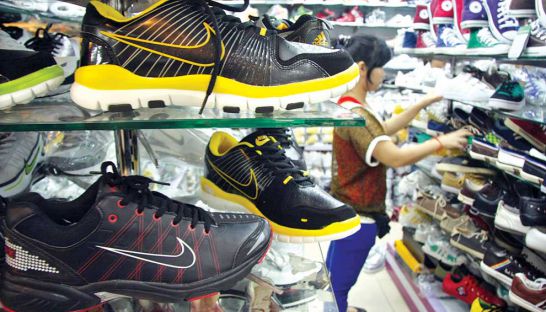Cambodia has sole objective for US
Cambodia intends to submit a petition to the United States government to extend the duty-free privileges of its Generalised System of Preferences (GSP) scheme to include footwear, giving local manufacturers a competitive advantage in the world’s biggest consumer market. But hopes are dimming as the submission deadline approaches and a bill proposing the exemption fails to make traction in the US Congress.
The GSP Footwear Act of 2017, which was introduced to the US House of Representatives in May, proposes broadening the annual renewal of the GSP programme to include footwear for the first time since the trade privilege scheme was introduced in 1976. If passed, the act would allow certain footwear products from selected countries with Least Developed Country (LDC) status to enter the United States duty-free.
However, support for the bill has been limited, with sponsorship from just three Democrats and two Republicans in the 435-member House and no recorded action since June. LDCs have been given until October 17 to submit petitions that could help sway Congressional support for the bill, which will expire at the end of the year if it is not passed.
Kaing Monika, deputy secretary-general of the Garment Manufacturers Association of in Cambodia (GMAC), said the industry body was working feverishly with the government to draft and submit a petition ahead of the October 17 deadline.
“[The petition] is still a work in progress, but together with the Ministry of Commerce we will have it submitted in October,” he said. “If the US passes the law it would open up a whole new market.”
According to Monika, footwear accounts for just $700 million of Cambodia’s $6.5 billion garment and footwear industry, with the vast majority of locally produced shoes, boots and slippers shipped to the European and Japanese markets. Purchases by US buyers amount to less than 10 percent of Cambodia’s footwear exports.
While this suggests enormous potential to increase exports to the US market, which imported $123 billion worth of footwear last year, local producers would need to adjust production to benefit from the bill’s proposed duty-free exemptions.
According to Monika, very few of Cambodia’s 59 dedicated footwear manufacturers currently fit the bill’s proposed GSP eligibility criteria, which include tariff exemptions on 17 product categories such as golf shoes, steel-toed boots and weather-proof leather knee-high boots.
“It is true that we don’t currently manufacture a considerable amount of footwear that would meet the bill’s GSP requirements, but if the US makes it a new law we would expect tremendous growth in the sector with new investors and orders coming in,” he said.
While the trade-weighted average for US footwear import duties is 10.8 percent, tariffs on footwear imports from LDCs including Cambodia vary from 8 to 38 percent depending on the product category.
Monika declined to predict how much Cambodia’s footwear industry stood to gain if the bill passed. However, when the US revised its GSP scheme last year to include travel goods manufactured in Cambodia, one GMAC representative forecast that the preferential trade treatment would boost the Kingdom’s exports of travel goods to the US market fourfold to $200 million a year.
The gains could be even bigger for the significantly larger and more established footwear industry, which Cambodian customs data show exported goods valued at $127 million to the US market last year.
Soeng Sophary, spokesperson for the Ministry of Commerce, said the inclusion of footwear in the GSP scheme would increase the competitiveness of Cambodia as a low-cost production base.
“If the footwear GSP were granted, Cambodia could become more attractive to the investors who are interested in this product sector, and could retain our existing factories manufacturing footwear products,” she said. “[This] would eventually reinforce our export capacity, and ultimately benefit the existing workers and expand employment opportunities to absorb much more labour available in the country.”
Sophary confirmed that the Ministry of Commerce was working alongside GMAC to submit a petition, pointing out that while Cambodia does not have much lobbying clout in Washington, if other LDCs also submit petitions it could sway US lawmakers to pass the bill.
“Cambodia is just one LDC among [many] in the world that could benefit from the GSP if the bill were passed,” she said. “[The bill] is a package for LDCs.”
However, Miguel Chanco, lead Asean analyst for the Economist Intelligence Unit, said the chance of the bill passing was remote. He added that even if the bill did pass, it was questionable whether Cambodia would be included given its political currents and the increasingly anti-American rhetoric of its ruling party.
“The deterioration in Cambodia’s democracy over the past few months will make it harder to convince US lawmakers to grant the country deeper market access in the near term,” he said, adding that the US domestic political climate was currently not conducive for broadening trade access.
“The Trump administration has gone after countries that run a merchandise trade surplus with the US – such as South Korea,” he said. “Crucially, Cambodia is one of the many countries in Asia that runs a trade surplus with the US.”
Source: http://www.phnompenhpost.com/business/cambodia-has-sole-objective-us


 English
English





